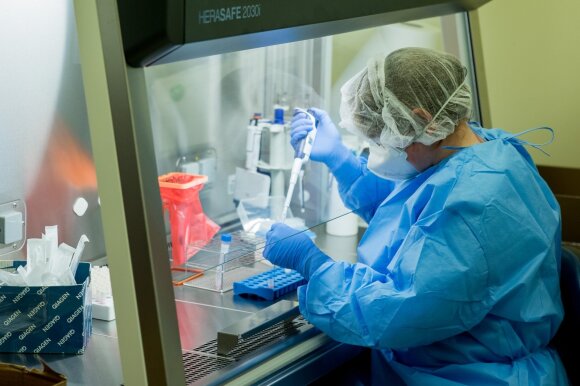
[ad_1]
The pandemic had the greatest impact on studies and leisure.
This information on the reaction of the Lithuanian population to the country and the global pandemic was obtained during the study of the Lithuanian Center for Social Research (LSTC) project “Implications of COVID-19 for public security: threats and new opportunities”.
At the same time, the LSTC study revealed that the pandemic brought new everyday practices into the routine: non-spread practices. Still, as LSTC chief investigator Dr. Sarmitė Mikulionienė explained, thinking about the success of these practices, it showed that 60 out of 100 people who experienced specific symptoms of the coronavirus went nowhere in the fall.
“A fifth of the Lithuanian population admitted to having experienced specific symptoms of the coronavirus. So what did they do? One hundred people experienced symptoms, 40 of whom tried to contact a hotline or an outpatient clinic, or both.
60 of them did not try anything, did not contact anyone. (..) In the end, the result was that 34 contactees got a professional answer about what to do. But of the 40 who called, six were unable to do so, “said Dr. S. Mikulionienė.
This means that it is not clear what 66 out of 100 people did when they felt the symptoms. Six percent of people seeking professional help or information about perceived coronavirus symptoms, or six out of 100 people, did not receive qualified help. Or 60 percent. people or 60 out of 100 people did not go anywhere and did not seek specialized help due to the symptoms they felt.
One-tenth don’t believe in the virus
66 percent. Study participants indicated that they personally knew at least one person diagnosed with coronavirus. 38 percent. Study participants were assured that they would feel anxious about the pandemic while in public places. 20 percent of people admitted that they already had to be in self-isolation.
However, 10 percent. respondents said they did not believe in the existence of the coronavirus.
The sense of security diminished
“The subjective safety of the population has been hit,” said Dr. S. Mikulionienė.
Safety was assessed on a ten-point scale during the study, where 1 expresses total insecurity and 10 represents complete security. Before the quarantine, the subjective safety rating was 7.18 points, and during the first quarantine it was the one that fell the most and was 5.64 points.
Between the first and the second quarantine it rose to 6.62 points, and during the second quarantine it fell again to 6.55 points.
What areas of life have been most affected?
According to the researcher, the greatest impact of the pandemic was seen in higher education and leisure. The impact in these areas was identified in 95%. and 83 percent. study participants. 65 percent. believe that the coronavirus pandemic affected family life, 64 percent. 55% of those surveyed highlighted the impact on work and 55%. – Financial implications.

Changes, as noted by dr. S. Mikulionienė, there were different directions, but more negative than positive.
“Still, some people evaluated the changes both positively and negatively. There have been changes in each area, the directions of change are different. The essential change is that many activities have become remote,” said Dr. S. Mikulionienė.
“The situation of the global pandemic has deeply and widely affected all practices of daily life and has caused people to feel insecure. Many of us had to think both about the fragility of life and about the values of life,” he summarized the investigator.
According to dr. S. Mikulionienė, distance learning and leisure activities and activities are more difficult for students to move to a remote space, which is necessary due to the pandemic. Implementing these practices remotely is the most stressful.
The approach to vaccination is skeptical
The LSTC junior researcher, project implementer Inga Gaižauskaitė, presenting the research results, discussed the Lithuanian approach to vaccines. Up to 27% plan not to get vaccinated. study participants. Vaccination: 40 percent.
According to I. Gaižauskaitė, reasons for non-vaccination include fear of side effects, allergic reactions, unclear vaccine reliability, and negative attitude towards vaccines.
The COVID-19 vaccine is received more favorably by men: 49% are in favor of vaccination. men and 33 percent. woman.
I. Gaižauskaitė emphasized that when thinking about deciding whether to vaccinate or not, the intention and the decision are different things, between which there is a lapse of time. “We have a time frame of circumstances and information within which change can occur. Therefore, it is important to know the motives of the population ”, explained the researcher.

child, girl, vaccination, vaccination, vaccine
Lithuanians yearn for a strong hand
LSTC Chief Investigator Dr. Diana Janušauskienė assured that the pandemic also poses certain challenges to democracy. “Crisis situations reinforce authoritarian tendencies and can have long-term consequences. The post-quarantine period is expected to have a lower level of democracy in democratic countries,” explained the researcher.
According to her, one in five people in the study yearns for a “strong hand.” “This is nostalgia for the ‘strong hand’, nostalgia for the Soviet era,” said Dr. D. Janušauskienė.
Even though Russia is mentioned less frequently in the public sphere and in the media, it remains one of the most frequently mentioned threats. 4 out of 10 people identify Russia as a threat.
The pandemic management assessment also revealed that one in five Lithuanians believes that quarantine is not necessary. Therefore, even the strictest quarantine measures, as the researcher pointed out, would not be endorsed.
It is strictly prohibited to use the information published by DELFI on other websites, in the media or elsewhere, or to distribute our material in any way without consent, and if consent has been obtained, it is necessary to indicate DELFI as the source.
[ad_2]